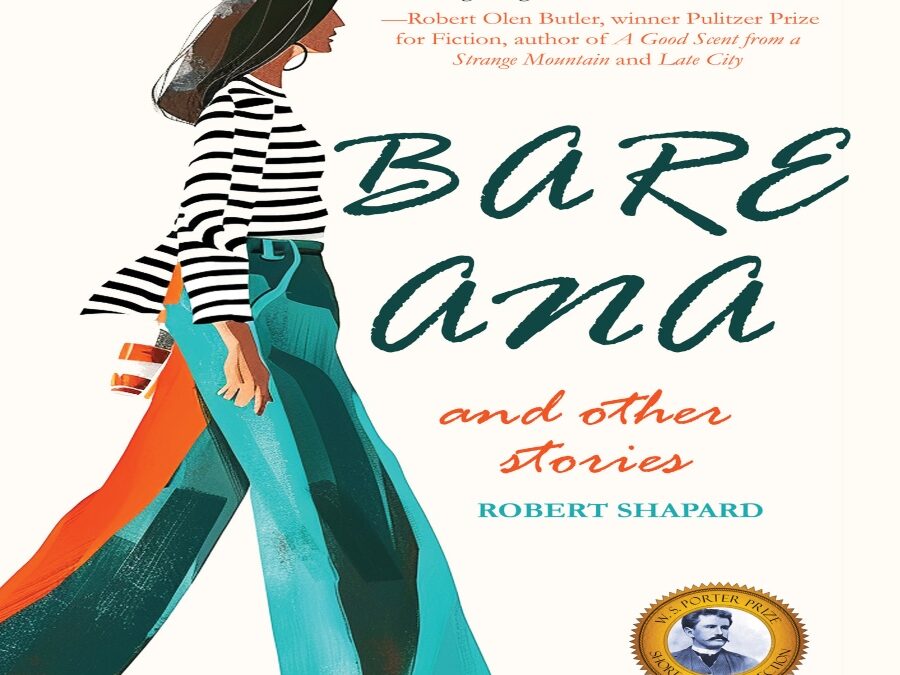
by Fractured Lit | Jan 28, 2025 | interview
Robert Shapard’s collection, Bare Ana and Other Stories, will be released by Regal House Publishing in February. Winner of the 2022 W.S. Porter Prize, this full-length collection brings to life an array of flash and short-short stories that are by turns delightful and heartrending.
Readers might have high expectations of a book by such a renowned trailblazer in the flash form; Shapard’s career includes co-creating and co-editing the iconic anthology, Sudden Fiction: American Short-Short Stories, in 1986, continuing through W. W. Norton’s long-lived and long-loved flash anthology series, including Flash Fiction International: Very Short Stories from Around the World.
I believe readers will not be disappointed in Bare Ana. Each story is masterfully crafted with an eye to character and circumstance. Shapard’s expertise and unique voice are on full display here. Nothing is predictable in these pages; the settings are vivid in ways you might not expect, and the characters face choices that will make your pulse race. I predict these stories will haunt you long after you’ve closed the book.
—Myna Chang
***
Myna Chang: First, tell us about Bare Ana and Other Stories. Did you have a particular goal in putting the collection together? Were you hoping to share a specific theme or mood with your readers?
Robert Shapard: I asked myself those same questions. A friend suggested a working title, “Water Issues and Other Safety Concerns,” like I was compiling a manual. It was tongue in cheek, though I did have a character walk on water in one of my stories. Another sank in a warm bathtub full of goldfish. But the stories are serious, even if a few have comedic elements. Anyway the working title is too long. Have you noticed how giant those block letters are on book covers now? And where would the bookstore clerks shelve a book with a name like a manual, in the “Self Help” section? I was re-discovering my own stories as I gathered them. Most are recent, but a few go way back. What I found, more than anything, was I loved the people in them. To me any could be the title character for a collection. Ana was the only one who lived in the future. In that way, she sort of stood above them all. And, if you put “other stories” in little letters, her name fit on the cover.
MC: I’d love to focus on your title story, “Bare Ana” (Juked, 2005). As a speculative fiction fan, I was struck by your compelling world-building. With a few quick strokes, you establish a distinct backdrop of social and cultural expectations, while keeping the reader grounded in the familiar. I’m curious about your approach to creating such a rich and complex stage without allowing it to overshadow your characters. How do you achieve the right balance?
Robert: I admire world-builder writers like Chris McKinney, who publishes with Soho Press. In his latest novel he has all humanity living under massive pressure at the bottom of Earth’s oceans. But “Bare Ana” is just a very short story, with hardly any room to construct a future world. So I had Ana’s young husband do it. He has advantages—his listeners are in the future, too, so he doesn’t have to explain the technology. When he refers to a “stem,” they already know what it is. We readers in the past have to put two and two together, but it doesn’t take long. The stem is in the middle of the parlor, and the tattoo lady goes right to it, so we know it’s important. Soon holograms are shooting up from it into the air along with commercials. That’s pretty much all we need to know about stems and a lot about this future society.
When he speaks of a “blooming” in the skin he’s reminding his listeners how excited they got when they were kids. It also puts us past readers in suspense with how blooming can go wrong. Other things like pre-natal teeth straightening simply function as examples without needing elaboration. And the reactions of the characters themselves can tell us a lot, like at the end when the nurse and doctor are both congratulatory and bored with the monstrous infant at birth.
There’s an anecdote for this that’s perfect. It’s the one about Gertrude Stein calling Ezra Pound a “village explainer.” She meant a particular kind of village idiot who is compelled to constantly explain things to people that they already know. I didn’t want Ana’s husband to be a village explainer.
MC: Stories with a strong sense of place stick with me. “Motel” is such a story—the dark road, the cinder-block motel, the utter isolation. And the dust! Can you talk about your inspiration for this piece? In addition, I wonder which came first for you: the characters or the location?
Robert: Location. It also came with a ready-made event. At 17, I was in a car with friends and crashed into just such a motel. It was on just such a night in just such a tiny town near the border of West Texas, South Texas, and Mexico. No one was hurt. Later, we did get thrown into a Mexican jail. But we’re not in “Motel” at all. The people in the story are completely made up. Where they came from is a mystery to me, and I care for them more than anything that actually happened to me.
MC: I think the cars of our youth often hold an almost mythical place in our memories. In your collection, several of your characters drive a Buick. Does this hold a special significance for you? Does it represent a certain time or place or mood?
Robert: I grew up in my grandparents’ house. My grandfather was a civil engineer who owned a company that built streets. It was a tough business, always competing for the lowest bid, and he drove the cheapest possible company car. But my grandmother—who was wise, loving, smoked, drank, gambled, and was the first woman driver in her small Texas city— had a pink Buick. It was the luxury model that had four, not just three, fake portholes on each side, like some weird rocket ship out of the Jetsons. It lacked the usual luxury whitewall tires, but my grandfather insisted the cheaper blackwalls functioned just as well. The power steering made for effortless driving except for hard, tight turns in parking lots, when its hydraulics made high-pitched squabbling sounds like an alarmed turkey. I loved that car. It must be buried in my subconscious because it has now supplied me with Buicks for three different stories. To be fair to my subconscious, I’d like to note that it has also supplied cheaper cars in other stories, including a 1947 Ford coupe and a 1978 Ford Pinto.
MC: Throughout the collection, I noted an embrace of white space and an ending note of ambiguity, inviting me in and allowing me the freedom to interact with the characters and settings in my own way. I love that! Do you consciously create this accessibility for the reader? Does it arise organically as you write, or is this something you layer in (or extract) in your editing process?
Robert: I like to think my stories end when no more needs to be said. It’s true they don’t all end with the snap of a lid. It makes me think of Grace Paley’s story “Mother,” which opens with her saying she always wanted to write a story about her mother and end it with the line “And then she died.” Yet we’re surprised somehow, when she does end with that. How did she do that? It took me years to realize that Paley could probably write for the rest of her life about her mother. So she came up with an anti-non-ending, and nailed it.
My story “The Dummy” caused a debate among the editors who nonetheless published it. One side insisted the story didn’t properly end. The other side said no, it was a challenge. A questioning of what a story is. To me the challenge wasn’t whether it was an ending or non-ending but just finding one. When the narrator discovered the body, he could have just said, “It was my father. He was dead. The End,” like Grace Paley’s story. But re-reading the story now, I see the father wasn’t real, in so many ways. I suspect as an actor he was just pretending to be the sixth-grade football coach. He even came to the dinner table dressed in various acting roles, pretending to be someone else, like King Lear or the Sheriff of Nottingham. Clearly, the narrator doesn’t want to lose him. The father’s like a movie the kid doesn’t want to end. Now, I’m seeing so many elements I didn’t know how to explain at the time. Yes, clearly the end is a call for reader participation. But what about the boy? He ran away from home in high school and had to be dragged home again. Did he have mental issues? Is he having one now? Is he the one who doesn’t know how to end? In one last look at the father, I see the one true thing about him now, whether he’s real or, as the story says, made of crumpled paper. He always loved the boy and his mother.
Another “white space” story that is easier to untangle is “Turtle Creek.” I tried longer versions with different endings. I followed the mystery of the couple missing from the wreck (never solved), I traced the lives of the youths at the party, who mostly didn’t come to anything. Were they a wrecked generation? It felt good, like whacking weeds, cutting those endings. I kept the shorter version, the one now in the book, trying it on everyday readers like trainers at the gym and acquaintances at the coffee shop. At the non-ending, all of them, independently, flared their eyes for a second. Then they all said the same thing: “That was my high school!” I’m not sure what this means, but it’s been audience-tested. I consider it an ending.
MC: Is there a specific story that embodies the heart of the collection? Which story is your personal favorite?
Robert: It’s hard to pick favorites, but I especially enjoyed writing the ones invented out of whole cloth, that seemed to come out of nowhere, like “Lobster,” “Best Boy,” and “Bare Ana.” You could argue any story, no matter how purely invented, is partly woven out of bits of memory. But these seemed to be less weighed down by memory than to unfurl on the breeze of an idea. Most of my stories unfurl, so maybe together they’re the heart of the collection. But the first story and last story have special meanings for me, as a writer. I was a long story writer until the first story, “Thomas and Charlie,” showed me I could write flash fiction, and others followed. The last, “Julie Elmore,” won a prize as a very long story (under a different title) so I wasn’t inclined to change it. Then, a friend challenged me to turn it into a very short story. I did, wondering, If the three quarters I cut wasn’t necessary, how could it have won a prize? But now it’s a better story.
MC: You’ve anthologized short-shorts from some of the best-known authors in the world. Is there a dominant quality or element that initially drew you to those stories/authors? Are you still drawn to those aspects of story, or has that changed over the course of your career? Are there any favorite pieces that you go back to again and again?
Robert: When we started we were looking to help establish a new form of very short fiction that didn’t have a name. The literary establishment of the day considered them odd, unfinished pieces of longer, legitimate fiction. Often, if they spoke of them at all, it was to mock them. We liked them whatever their quality—funny, moving, powerful, charming, experimental—often with the reach and depth of a traditional story, just in a tiny space. That left your “dominant quality or element” in collecting them simple. They had to be short enough, and they had to be great, to quell those mocking critics. To focus on the story, we blacked out the names of authors on batches we sent around to readers, helping us rate them. Later, when we had to match the stories with author names, we weren’t surprised that some were well-known. More surprising was how many were not. Not everyone could write a great story, but a great story could be written by anyone. We always held to that. Yes, there were adjustments, such as for the international anthologies, where we relied on translators, some of them responding to the demand for work by well-known foreign authors. But they translated lesser-knowns, too, and the translators themselves were often lesser-known, and their work was brilliant. They added to the form, which by then had various names—flash fiction, sudden fiction, micro fiction.
You asked for favorite pieces. There are so many. Here are just a few:
In Flash Fiction Forward, Hannah Voskuil’s “Currents” is a story in reverse that we care about as it moves ever back in time. In Flash Fiction International, H.J. Shepard’s “Please Hold Me the Forgotten Way” and Edmundo Paz Soldán’s “Barnes” are perfect examples of an American flash versus a Latin American micro. In the “Theory” section, Katharine Coles’s is my go-to mini-essay on the difference between flash fiction and prose poem. I never tire of Jayne Anne Phillips on writing good one-page fictions (pair it with her essay, “Cheers,” in The Rose Metal Press Field Guide to Writing Flash Fiction). Finally, in Sudden Fiction, John Cheever’s “Reunion” is perfect for a single class in characterization. But so is Sara Freligh’s “Reunion” (with the epigraph, “After John Cheever”), which I read recently in her book A Brief Natural History of Women. Cheever’s is brilliant, a two-dimensional snapshot; Freligh’s is equally brilliant and three-dimensional.
MC: Do you see any upcoming challenges (or opportunities!) facing flash writers/editors? Do you have any hopes or predictions for the field?
Robert: Since I go back a ways with flash I tend to look at the big picture. Not that long ago, translators Aili Mu and Julie Chiu were telling us flash had become highly popular in China because flashes are “device independent and compatible with today’s technology” and “offer relative freedom from censorship not enjoyed in other media.” Oppressive regimes in the Middle East and elsewhere have been known to censor not only news but fiction, and others may in the future. But flash isn’t just a reaction to politics. A young scholar from India, Dr. Ruchi Nagpal, came to Austin just this fall to explore the Harry Ransom Center’s Flash Fiction archive (it’s the world’s second, the world’s first is at the University of Chester’s Seaborne Library). She says, “Everyone in India has a smartphone and tablet,” and micros are everywhere. She’s also into flash theory, wants to anthologize flash fictions from other Asian countries, like Singapore, and is interested in long-thriving Spanish language forms like the microcuento. And now the rest of the world … but wait, let’s stop here, because if we add the United States and other English-speaking countries, we’ve already got more than half the world’s population.
That’s a long way from a time—not that long ago—when establishment critics were dismissing flash as hardly worth reading. So with its tremendous growth, has flash now become a true sub-genre of fiction, like the novel, novella, and short story? Does it matter? I see flash as still changing, exploring. Haven’t the novel and poetry changed over time as well?
As for new challenges and opportunities, I judge by what I see in bio notes these days. More writers are describing themselves as flash fiction writers, often in combination, such as “novelist, poet, and flash writer.” That tells me they’re expanding their vision and skills as a writer.
MC: What are you working on now? What’s next for you?
Robert: I write stories whenever they come to me. But today I’ve been sending around early copies of Bare Ana and Other Stories, hoping people will review it. (My publisher, Regal House, a wonderful, small, traditional press, does that too.) Last night a revision for my novel-in-progress woke me and I scribbled a note which I discovered this morning: “What if J never went to college? It changes everything.” Over coffee, I thought, “Was the J for Julie? or Jonathan?” If I remember, who knows where it will take me.
***
ROBERT SHAPARD’s stories have appeared in magazines such as New England Review, Necessary Fiction, New World Writing, 100 Word Story, The Literary Review, Juked, Bending Genres, New Flash Fiction Review, Fractured Lit, Kenyon Review, and Typishly. He and his wife live in Austin, Texas.
Find Robert:
Website
Facebook
Instagram
X
Bluesky
MYNA CHANG is the author of The Potential of Radio and Rain. Her writing has been selected for W.W. Norton’s Flash Fiction America, Best Small Fictions, and Best Microfiction. She has won the Lascaux Prize in Creative Nonfiction and the New Millennium Award in Flash Fiction, and her poetry has received a Rhysling Award honorable mention. Find her at MynaChang.com and on Bluesky at @MynaChang.
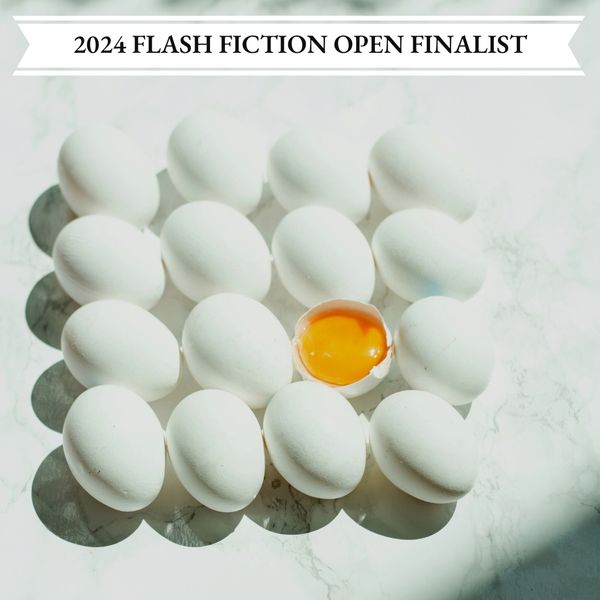
by Kristin Jensen | Jan 27, 2025 | contest winner, flash fiction
We were in search of eggs. White ones like the moon, and some as big as newborn puppies in the palm. Biking wasn’t smart because you’d miss the little things hiding in the weeds and bushes, placed out there for us wives to find. It was the daddies of our men who told them what to do. And how to hold the eggs.
Debra, crazy-eyed, found hers first – small and speckled, like a quail egg. She cracked it against the curb at 24th and Mission, and it cried. It cried as we hunched in our large pastel dresses with wicker baskets, also looking. We covered our ears because of the sound and what we were told would be our good and broken hearts. We’d be cracked open and in real love – a love that women who are not mommas just can’t know – like not knowing how big the universe is.
I didn’t find my egg but stole another’s. I pushed her into the street. A bus was coming. I wanted to see her yolk.
***
I woke in my husband’s arms. I turned onto my side, and he curled around me. Dotted my neck with kisses. I put him inside.
When I got up, I looked back at our blue sheet with its melted goo. The spot looked like pee. I wondered how much urine a baby would make. My sister’s seven-year-old son still pees in the bed, which seems absurd.
“You made a puddle,” I said to him, joking.
In the bathroom, I got the syringe, bent, and my husband did it in my freckled bum. I cried out. Yelp!
He kissed the part where he poked. His father had done this for his wife. His father is progressive. He is a socialist. He’d taught my husband as a boy about the names of the parts of a vagina that I don’t even know.
My husband had also done this for his first wife. It had worked – they made a son, then divorced. He tells me every other day how much – how boundlessly – he loves his son. Sometimes, my husband cries, telling me this. I hold him for some time. “You will feel this love too when you have a baby,” he says. He is ten years older and I am thirty-three.
The boy is an annoying child who I am trying to like more or love. The journey from dislike, to like, to love feels like mountains.
When the boy enters our home, he hugs me. I pat his silky, brown hair. Then he runs in loops around the kitchen, asking to be chased, but he will always win the game. I fear I am becoming a mean-hearted person. Something like rust.
When the boy is with us, I try motherhood. Then ask silently for childhood when the boy is not. The distance between my childhood and motherhood also feels like mountains.
***
After the shot, I wobbled, wavered, and limped dramatically into the kitchen to heat the water in the kettle. More water on the stove for soft-boiled eggs. Cold water to just drink. It was a quiet Saturday morning with just the two of us. I asked him to dance. It was how we had met. I felt like magic again, like I could conjure the little thing.
***
I used to be good, real good, at Easter egg hunts growing up. I’d always get more than my sister. I ran for the bushes at the edge of the grass and kicked down stones with sayings like Grandfather’s Garden. I knew what was inside the plastic eggs and what they would taste like. I knew how it would better my life.
“Can I have that?” My young sister had pointed to a small, chocolate rabbit in my basket. She had sweat on her forehead.
“This isn’t Halloween,” I told her.
My sister is smart now and tells me how dreams have to do with fear. She tells me of the fears she had before her son. Like, what if the baby just had one eye, shouted all the time, turned on you, turned into you, left, told you how you’re shit, or didn’t come at all?
***
Last week, my husband printed out an article and read it to me in bed. The house was quiet. Near empty. I pushed up against him and then wiggled over the hill of his body, sagging my full weight onto him, and then dropped off the other side. What I remember from the article is how babies are the size of gummy bears when they’ve been in there for a month. He seemed restless. He licked his lips.
Lying back to look at the ceiling, I thought of what candy I knew, for sure, that I liked, in my basket. Peeps, Robin Eggs, and Jelly Bellies. He put his hand on my empty, and mysterious, belly and smiled, wide, hopeful, and beautifully at me.
I fell asleep into a hunt, wearing a space suit with a spear, to shish-kabob planets.
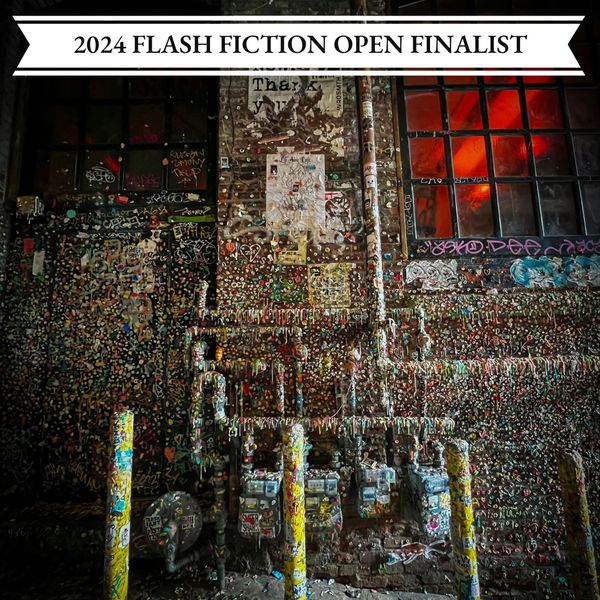
by Emily Hampson | Jan 23, 2025 | contest winner, flash fiction
Your perfume suffuses the hall, assaulting me before you do. Jo Malone Waterlily. You only wear it at night, a panther seducing a mate. Three days ago, I’d clocked the bottle on your vanity, drawn to its pale blue orb. Pressing my nose to the glass, I was 8000 miles away. Back home. Lychees and white tea.
Tonight, his hand clasps your elbow, wearing you like a purse. He likes it when you flaunt a skirt, likes to snake a finger up your pale thigh. Nibbling at your earlobe, he cocks an eye toward me. To him, everything is a performance. An audience to covet his shined shoes. Gold watch. Young lover.
You giggle, batting his hand away. Your evening bag swipes my cart, toppling the shampoos into the lotions. You mumble an apology that might be mistaken for shame, but you don’t glance back. I’m merely the pushcart, obstructing the hallway like a yellow caution sign that reads, “Slippery When Wet.”
Before walking away, he snatches a turndown mint, drunk on his own charm, and says to you, “What are you always apologizing for?”
I bite my tongue, a trained pet licking salt off your salacious secrets. Used condoms strewn across the carpet. Bloody maxi pads. Room service trays shouldering mutilated omelets and pumpernickel toast. Shopping bags and clipped price tags dangling over the trash bin. Unflushed turds, floating in the toilet bowl like dog kibble—evidence that your Michelin meals deprive you both of fiber. Souffles and sauces. Confits and caviar. Even $500 dinners turn to shit.
Before, I’d pant with excitement at the Armani suits and Dior handbags hanging in the walk-ins like marionettes ready to perform. Business trips lapping into tidal pools of leisure. But I know better now. I know your five-inch heels and cappuccinos with extra foam. I know your disdain for cheap cantaloupe and insistence on feather pillows. I know your toothpaste globs and the vibrator you stash in the nightstand drawer beside the hotel Bible. You’re all the same. Penthouse tips are never as sizeable as the orgasms.
Neither of you speak to me. Not one hello. For the full two weeks. You barely look.
Still, I nod, a contrite bow, as you breeze by, day after day, with the same disregard you bestow the Ficus plants. There are two on every floor, starving for sunlight – dark green sentinels guarding the elevators. Management pays some lady to water and exercise them every Tuesday, like hospital patients in need of PT. Sometimes, I pause in the hall to watch, pretending to search my cart for towels or French-milled seashell soaps. I focus on the woman’s fingers caressing the broad, glossy leaves and count back the months since I was touched.
On your final morning, you sleep in past check-out, the Privacy sign askew on the doorknob. The manager reluctantly calls the room. I knock four times before you answer, bloodshot eyes and tangled hair. You blink at me, your nipples straining against your white t-shirt like another pair of eyes. I stare down at your bare feet and your toenail polish is the exact shade of dragon fruit.
Twenty minutes later, I knock again, ready with my master key, but you’re already gone.
The suite is warm and sticky, with humidity pooling from the shower. White powder clings to the coffee table. My eyes dart to the bed. I can’t help it. Hope blooms like mushrooms after rain. Nothing. Only soiled sheets and a twisted duvet. My teeth clench. I count $1.63 in coins on the nightstand and pocket the change. I empty the trash, dust the windowsills, and vacuum. I inspect the closet and replace three wooden hangers. To you, everything was already yours.
During my break, I wander down to the newsstand and buy a pack of Bubblicious. I crack my knuckles and sit in the alley, watching a cockroach scurry beneath a pallet of rental chairs. When it disappears, I chew each piece of gum, one after another, sucking on the sweet bursts of artificial watermelon, letting the syrup leak down my chin, thinking about how $1.63 would pay for a day’s worth of food for my mom and five sisters back home.
Rice. Curry. Medicine.
America, The Free.
I gnaw until it runs out of flavor and then spit wads onto the concrete—pink phlegm pocking the pavement like a rash.
For a long while, I stare at the carnage, satiated on the seductive gluttony of wasting something.
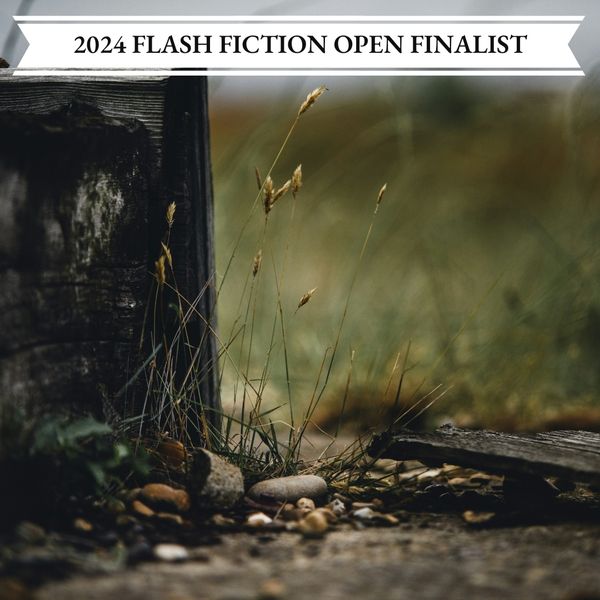
by Diane Glancy | Jan 21, 2025 | contest winner, flash fiction
A dream is a film happening while you watch.
A boy running with a flowered pillowcase flying from his hand like a cape. Where did he get it?
The boy in a space like a dog-trot— the open space between the two sides of a house. But this space between houses. The pillowcase a sail. How the boat got to Patmos to depart from John. Banished for preaching Christ. How in dreams things are the same and also their upward counterpart.
I was in a hefty place. A ditch by the road. Watching the boy running. Then I was awake, and he was gone. A bully is the waking part.
This is the line of grief we must bear.
I heard later the wind blew down the Taco Bueno sign. It fell into Burger King, shutting them both down until the windows could be replaced. Where would we eat?
I could imagine I was with John the Drifter. The one banished to Patmos Island where there was not tree or any provision. Volcanic in origin.
I had questions for which I was in trouble. Until I sat on the back row. I asked how John wrote on Patmos. Had he thought to bring parchment and pen? His wax tablet and stylus? Did parchment drop from heaven like manna? Had authorities allowed him a travel bag to exile? A rucksack?
At night, John gathered stones to place on the edges of his outer cloak. To hold it down. So he could cover himself, sleep, and not chase the cloak blowing in the night wind that peeled off the sea.
A man with the wind in his hand. You know the tomato-stand on the corner?
Is the Aegean Sea salty? I asked the teachers at the Church of the Risen Lord. Was there a well on the island? How did John get water as he wrote on the island without a tree to shade him? Did he make a booth with his outer cloak? What did he prop it on? Did he bring tent poles? Did authorities make a make-shift tent before they left him on the island?
And the sweet teacher at the Church of Risen Lord who had cupcakes for brains did not answer.
How did John start a fire to cook a fish? Did he bring a pole? A hook? And bait? Wait. All of them were fishermen of the patrol of miracles. They called the fish to jump on the shore. In the heat, a fish could cook on a hot stone in the sun.
John was told to write what he saw. And the film began. The little beasts around the throne with their bleatings and mooings and howls, saying blessing and honor and glory and power to the Lamb forever.
We thought of running from the church. There was a wide field beyond the tree-line. They would not miss us. The first turn past the Dry Goods Store.
Once, the island of Patmos was called Letois. Named after Artemis. It was at the bottom of the sea. But when the moon shined upon the water, Artemis saw the island and wanted it for her own. She asked Zeus, who was god at the time, to raise the island to the surface of the sea.
Or there is the story that Orestes, after murdering Clytemnestra, his mother, fled to Patmos when Erynies was after him.
The boy with the flying pillowcase trailing off his hand. The narrow space to run between.
The elders up there on their benches watching us.
These two-pronged stories, whose histories don’t match but overlap, sometimes contradicting one another.
They found us hiding in the ditch. We returned to the place we ran from. We were not punished. Only watched. If we moved. A shackle lifted on the bird of prey. The wistfulness that screeched before each breath. We would have floated over time.
We are walking the shore in penance. Not full of beasts and elders and the sea upheaving and the mountains dismantled. The excess of our lives independent of the mooring it takes.
How many stories do you have going on, the critics asked?
There are multiple projects, I answered. It seems now the stories mixed. I could not tell one from another. Or in which story they belonged. But braided together the way traffic waits around every corner. We sat at the curb watching. The truck arriving with the large plate-glass windows to repair Burger King. The Taco Bueno sign still askew. Farther down the road, the large, tin rooster on the old Mi Casa van on its side.
What is the real story? They kept asking. What point of view are you in?
Didn’t they know we lived in several parallel worlds? Not set aright. One level missing another. Left to fend. To tend this sweet side of bliss.
Subtext and subtitle
To Rem35mm
In the forest. On the forehead of leaves. A projector unrolls its story.
A spool from which moving images move to the sub-spool below the lens.
The story comes from the earliest critical theory. Of voices in a flood of narration in the coherence of the layered grasses of the will.
A dream presents the surreal edgings of the real.
I found the road-markers in the film. The onward-going structure was disrupted by thoughts of struggle tied to memory.
To mark with transitive contrariness. Outside of which could not be understood. Two spools turning on a projector unrolling and rolling past the lens.
Banished to a barren island. Until the stones could not hold down the island and it rose.
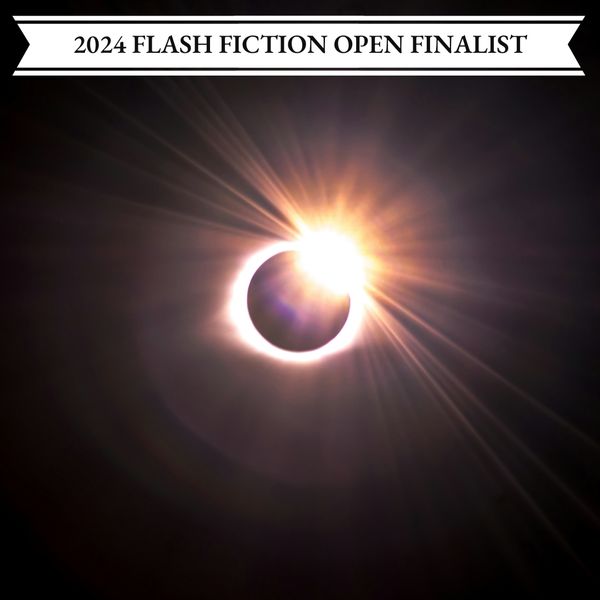
by Stephen D. Gibson | Jan 16, 2025 | contest winner, micro
Our tiny mountain town became a city, at least for the day. Even I had a sign on the front door: “Don’t be a Daredevil! Protect your sight with eclipse glasses!” and a pile of them on the display case with all the best Magic The Gathering cards fanned out underneath.
I recognized her the second the bell on the door chimed. She looked so much the same but better. An adult now. Mature. Surrounded, as she always had been, by adolescent males. Those three could have been her kids.
“I’m so glad you have these,” she said and picked up five of the glasses before looking around.
“Mom,” one of the boys said, “Mom.” He already held a Dungeons & Dragons Icons of the Realms Zuggtmoy, Demon Queen of Fungi pre-painted figure. In the box of course. I smiled. She walked closer to pay for the glasses; he was on an intercept course. Both moved toward the register.
I haven’t changed much, I don’t think anyway. And we looked at each other. I thought her eyes were browner. Was there a moment of recognition? A so-slight smile?
Probably not.
Her boy put the box up on the counter and I expected the same drama I had seen many times before, but she just bought the glasses and Zuggtmoy. A heavy, black metal American Express card.
“Wait a minute,” one of the other kids said. “Wait just a minute,” he said, looking at all the anime on its shelves, but then they were gone.
If she recognized me, she wouldn’t admit it. She’d taught me a lot. More about people, physics, and math than I’ll ever need. And I thought about following her out onto the street, where the moon would soon protect us from the sun, but I knew I couldn’t fight our history.
Instead, I spent the day making myself content with it.

by Mary Elizabeth Dubois | Jan 13, 2025 | flash fiction
Still, nobody knows if it’s better to write about snow on a country road from an apartment in the middle of an urban sprawl, in a small cabin several miles away from the country road, or on the country road itself. Still, nobody knows if love can exist only in time, like most concepts and biological processes, or if love is independent of time, because it is a more mysterious form of experience that existed before metaphysics and Euclidean geometry, as we understand them in the human sense. Nobody knows. Sometimes I like to listen to the birds and children through the open window (European), but sometimes I resist the Stoßlüften because I want to feel sealed inside of my atomized identity (American). Nobody knows which of these actions inadvertently represents a nonpartisan conservative ideology. Still!
***
Reproductive futurism is unsexy, but so is the revelation that you might never make a choice about having a child. The day might come when you are too old. I try to remember certain things about my relatives, my friends from high school, or girls I knew who went to the school one town over from mine. People tiptoe in and out of view. You have no choice; you chop more vegetables. Even as I try to remember that girl, the girl I liked with the light brown hair, the non-obviousness of memory reminds me that I will only ever remember her fully in dreams. She wore under-eye eyeliner. She resisted the mandatory, tri-county beauty pageant by cutting a hole in her dress, at the crotch.
***
Santal. I’m alive to breathe in the candle. I’m alive to warm up the chicken, eat it in a bedroom, then open the windows and spray the room with scented linen spray. On the windowsill, a plant from my boyfriend brightens inside a beam of sunlight. Sometimes, I imagine the plant is my boyfriend. It helps me sleep. But sometimes I wake in the night shivering from the desire for solace of a different kind, the kind that comes from novels, old quilts, and ideas about the future that involve women, solitude, oceans. My boyfriend still exists in that fantasy, but he is far away on a different continent, taking care of our children, or building wooden sailboats by hand, or having a quiet but passionate affair with the son of the woman who owns the seaside tavern. We write each other letters. We live our lives apart. The attention of the other in memory is comfort enough.
***
I want what two other women I know want. Expensive sheets. A black iPhone without a case, spinning on a larger piece of translucent circular glass. Flowers and jewelry, given to you by lesbian lovers. Affairs. First-person narratives and confessional poetry, written for, about, and with us. Dreaming without analysis. I want to escape the dirty house I live in, where my roommates are two boys. But I want the boys to visit me in my new house, which, in the fantasy, is sparklingly clean. I will wash them in the bath. I will soap them up like children, then let them watch the largest bubble. It will float towards the ceiling. It will not pop.
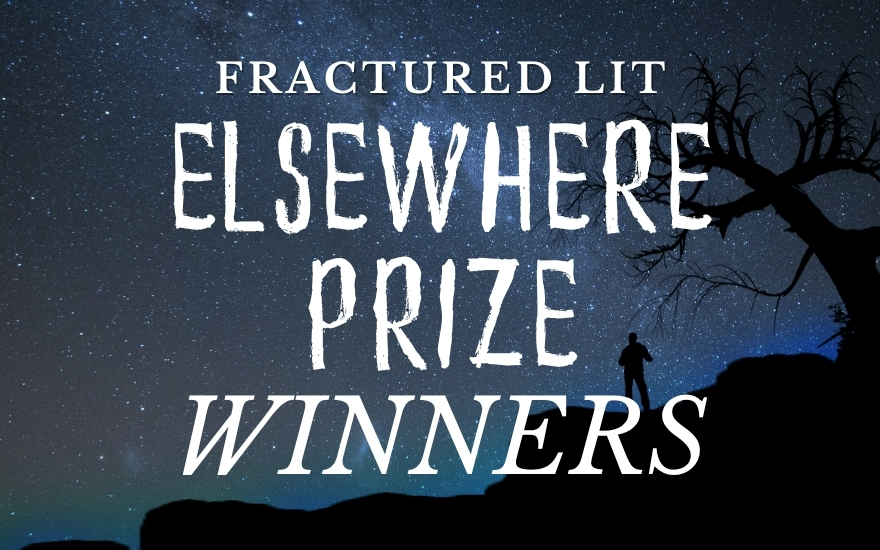
by Fractured Lit | Jan 10, 2025 | news
We’ve got our winners for this contest!
1st Place: All and Sundry by Candace Leigh Coulombe
This story captures the spirit of Elsewhere by transporting us to a familiar place made utterly surreal: a mega mart with everything from milk to robot lovers to xenobiological babies. The recurring theme of a lost child lends a haunted air to the mega store, which is, on its face, a place of plenty, but in reality, it only reflects the gaping hole we try to fill with consumerism. And there’s no better place than OmegaMart, to find “the things that you’ll lose and the things that will make you forget them.” The echoes of the child calling “Mama, mama, mama” will stay with me as long as I stroll down the endless aisles of a megaversal store, searching for a panacea for uncertainty with the shape of our lives. ~Tara Campbell
2nd Place: Sweetie Come Brush Me by Leesa Fenderson
People and language define the environment of this story. Pumpkin Circle is a distinct place with vibrant characters and an unconventional narrator, a collector of “rumors and how-tos.” In this example of universality through specificity, lessons on how to ride a bike downhill and peel a mango unspool alongside neighborhood stories of love, betrayal, and regret, drawing us in regardless of where we’re from. The sensations and flavors that surround the characters both nurture and torture them, and the language is unfettered, trusting us as readers to bridge the divide between our “where” and this Elsewhere. ~Tara Campbell
3rd Place: The Ox and the Magpies by Suqi Karen Sims
The story might be ancient, but this retelling puts a new spin on the Chinese folktale “The Cowherd and the Weaver Girl.” With beautiful language, the author places the emphasis on the role of the animals in the story, sharing their thoughts as they stage-manage the humans in the narrative. Magpies might be jaded and have other things to do, but they have their reasons for helping to reunite the lovers of legend. ~Tara Campbell
We’re also publishing Marked by Desiree Cooper & Or the Highway by Holly Pelesky
- Like Prey by Abigail Bereola
- Marked by Desiree Cooper
- All and Sundry by Candace Leigh Coulombe
- Of Souls & Forests by Arria Deepwater
- Crow by Renesha Dhanraj
- Sweetie Come Brush Me by Leesa Fenderson
- A Lamb, Rising by Freyja Harrison-Wood
- Fireworks at Dusk by Jennifer Musaji
- Or the Highway by Holly Pelesky
- The Marvelous Daisy-Sue, Every Sunday After Church by Al Shapiro
- The Ox and the Magpies by Suqi Karen Sims
- The Yard by Ivan Suazo
- A Man Will Come by Colin Watts
- Universal by Hally Winters
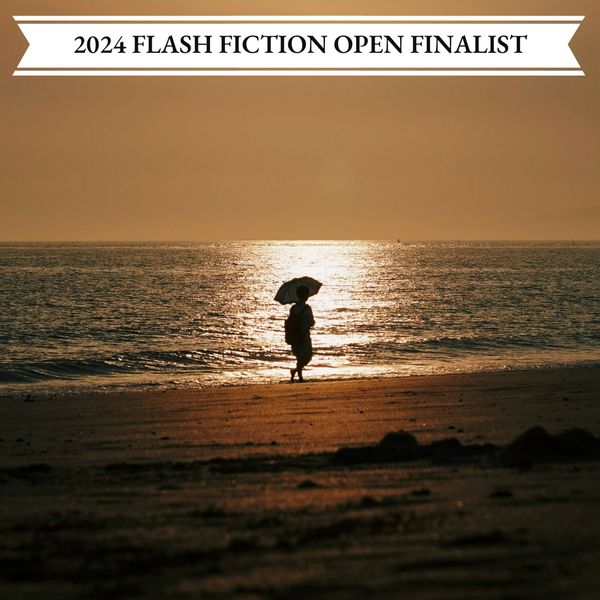
by Michelle Brady | Jan 9, 2025 | contest winner, flash fiction
The first person I killed didn’t run. I never knew his name, just his crime, so I called him One. “I didn’t know I should run because I couldn’t hear the rotor blades chop-chop-chopping,” he said, sitting beside me on the porch—not the way I left him; the way I met him: whole, covered in Afghan dirt and barefoot, hot from digging.
We could only see heat, so I don’t know what color his clothes were or if he was sweating, but I knew he was hot, alive. I sipped my G&T and nodded. My soldiers made a t‑shirt to that effect. Don’t run; you’ll only die tired. The Apache helicopter on it had eyes and teeth. They didn’t think it was funny exactly. That would be too simple, and people are never that easy. Still, I thought it was best not to mention it to One. “Drink?” I said instead.
He laughed. “I am not sure that would work.”
I smiled. “You’re the first dead person I’ve talked to, so I don’t really know the rules.” And the first ghost I created, I didn’t say.
“I have to say I am disappointed to have been gunned down by a woman. No offense, of course,” One said.
I didn’t reply. I was done proving myself to my fellow soldiers, and I had no intention of proving myself to a dead guy.
He looked around and added, “This place is so different from home, so green and bright and clean.”
I’d thought the same thing many times. The unspoken parts, I mean. Why was I born here and not there? Why did I leave it for the gray-brown of Afghanistan? I took a deep breath and asked the one thing I tried never to think about. “Did you have kids?”
One looked out across our South Georgia neighborhood from his rocking chair. “I do not remember my name, but I will not let myself forget theirs,” he said.
I went inside and closed the front door between us so he wouldn’t hear me cry. It wouldn’t have done him any good.
***
One and I met on a dusty night in 2013. To me, he was a white human outline on a green background that I could see through the monocle over my right eye. My left eye never saw him. To him, I didn’t exist. The area my attack helicopter company patrolled was monitored by huge balloons tethered to infantry positions, like blimps. A ground unit had been watching One lay explosive lines to kill US forces for over a day before calling it into us. But he was my first, so I watched, too, taking nothing for granted. I watched until we were low on fuel, and it was time to act.
Afterward, my commander invited the rest of the leadership outside his tent for cigars to celebrate my successful first engagement. Someone offered to nominate me for a combat action badge, and several others expressed their relief that I could do it. “Because, well, you know,” they said. “Women need to be nurturing to be good mothers. It’s just science.”
***
He started visiting me after my first miscarriage, always after dinner on the porch. “One for one,” he said. “Kind of ironic, right? Is that the word?”
I turned sharply to him, regretting telling him about the baby, but just sighed and said, “I guess it is.” Anger would have been too hypocritical even for me.
“At least you get another chance,” he said thoughtfully.
“Tell me about them. Your kids.”
He didn’t say anything for a minute. “Girls,” he said. “Afhak and Adiam. I do not know how old they would be now. How long have I been—”
I didn’t hear the rest as the door slammed between us, and I took up my familiar crying position on the entryway bench. Two girls. Girls without a father to protect them in a place where girls needed a father to protect them.
For the first time, One followed me in. “They will be okay. They are survivors,” he said quietly.
I ignored him, choking on my breath, my face buried where I couldn’t see his.
“It is better that you killed me. If I’d been supporting the US, they would all be dead now. This way, they have a chance.”
I didn’t really believe him, but I looked up. Eyes I never actually saw held something like pity. “I won’t have another chance. I can’t have children.”
He nodded slowly. “One for one,” he said.
But, of course, he didn’t know that he was the first person I killed, not the only one. He wouldn’t have thought it was comforting, otherwise.

by Lindsey Godfrey Eccles | Jan 6, 2025 | flash fiction
In the small hours of the morning, I forage, taking care to nibble leaves both fibrous and tender, for the stories of a world are woven not only from what is young, what is hopeful, or what is easy. When the sun is high, and the air is thick and hot with blossoms, I retreat to my well-camouflaged habitat and extrude. My clumsy fingers, far less dexterous than the inhabitants’ claws, work the lustrous strand and experiment with braids and knots.
My colleagues are correct. The task is impossible. But why not this world? Why not this people? Strangeness is no reason to stand aside and let them be forgotten. I know I’ve poisoned myself; I may be as doomed as they are. But every night, I choose to stay, and on no cloudless, perfumed morning do I regret it. Never before have I encountered a world where wisdom resides in youth.
***
My first day on this planet I came across what I knew in my soul were books, each of them tucked into a tree bole or the crotch of a branch. But I failed to see them for all that they were. Instead, I confused these enormous, multicolored egg-shaped arrangements of fibers for mere artifacts and, investigating, soon found I’d opened a cocoon before its time. An adult so large it could not have fit inside my ship alighted beside me and folded its wings, mesmerizingly patterned in brown and grey, but instead of putting me to the end I deserved, stood by and watched as a half-formed thing emerged, flightless, an abomination. Together, we bore witness until it died.
After that, I tried to keep my distance from the larvae, but before long, curiosity got the better of me. I sat and watched the monstrous segmented worm-children, imitated the clicks of their mandibles. They showed neither fear nor interest. I cannot say I was free from fear myself, but I watched the larvae spin and weave their lives’ work. Adults cast wide shadows from the spaces in-between the higher branches, but despite my one terrible mistake, they let me be. It was difficult not to touch the larvae’s iridescent strands of violet, fiery red, and sunset pink, but by then, I knew better.
***
Imagine my surprise when the first thread dripped from my rectum. Extrusion is less uncomfortable than you might think, not unlike excretion, which can, of course, be welcome. My threads are not as strong or smooth as the threads of my young mentors; they are certainly less beautiful. But no copy is ever perfect, and I will spin the story of this place as best I can.
I will not weave my own cocoon on stem or branch but on the cold contours of my ship’s interior. And when I emerge from my masterwork on the world that is my home, I will not be the creature I am now. Will I crawl forth, unfurling wet wings stamped with the unblinking eyes of my deepest fear? Perhaps. For now, I extrude, and I meditate on what I know, which is that the people of this world have shown me a grace I do not deserve. And I will give them everything I have, in memory of the child whose strand I broke.
Originally published in the Librarian Card Catalog project from Air and Nothingness Press.

by Fractured Lit | Dec 22, 2024 | news
Congratulations to the writers of these 14 speculative stories! We’ll be back shortly with our winners!
- Like Prey
- Marked
- All and Sundry
- Of Souls & Forests
- Crow
- Sweetie Come Brush Me
- A Lamb, Rising
- Fireworks at Dusk
- Or the Highway
- The Marvelous Daisy-Sue, Every Sunday After Church
- The Ox and the Magpies
- The Yard
- A Man Will Come
- Universal











Recent Comments